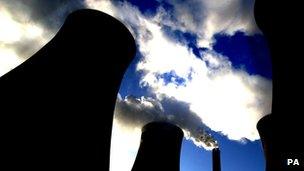Why Treasury may reject nuclear option
- Published
- comments

I am still convalescing, but am easing myself back into work. And because even in my malaise I could hear the agony of the French energy giant, EDF, in its standoff with the Treasury over what rewards it should get for building a new nuclear plant at Hinkley Point in Somerset, that seemed a plausible re-entry point for me.
This dispute does seem more serious than the Treasury's habitual battles with the private sector over rewards that are acceptable for large infrastructure projects where consumers (you and me) end up paying. Which may seem rather extraordinary, in that the Hinkley deal has been ten years of negotiation and preparation, and represents the most significant potential investment in the UK by an overseas enterprise for donkey's years.
Proof of the gravity of the hiatus is that EDF has recently cut its dedicated nuclear workforce by 20% or 150 people, and stopped recruiting, because - in the words of an EDF source - the company felt it could no longer "burn money" (no jokes please about how that might be cheaper than more conventional fuel).
This impasse matters for two important reasons. On the one hand, as the energy regulator recently warned and the Commons Energy Select Committee today reiterated, the UK faces a serious and potentially dangerous shrinkage in its energy capacity over the next few years. Although we've had warnings for almost two decades that if we don't start investing in new plants we risk seeing the lights go out, this time Peter may well have seen the wolf.
And on the other hand, the Hinkley project on its own would create vast numbers of jobs, wealth and tax revenues - at a time when there is not exactly a surplus of big new investments being made in the UK's flatlining economy.
The round numbers of Hinkley are that it would employ 25,000 on the construction alone, at a cost of £14bn, and - according to EDF - would in the process generate taxes equivalent to a few percentage points of what the entire financial sector yields for the exchequer.
Now I am going to park the environmental arguments about nuclear to one side - not because they are unimportant, simply because they are irrelevant to the dispute between EDF and the chancellor.
Broadly what it comes down to (in terms that may seem unenlightening when stated baldly, but I will elucidate) is that EDF feels it needs an internal rate of return on Hinkley of 10%, and the Treasury fears that means it would make excessive profits.
Now the internal rate of return, or IRR, matters to us, because it in turn determines the terms of the so-called contract for difference agreed by the government with EDF, which in turn determines the price that consumers (us again) will pay for nuclear-generated electricity.
Or to put in another way the higher the IRR, the pricier power will be in the next decade.
Now EDF would argue that it is not being greedy, but it can't put its own shareholders at risk at a price - that IRR again - that doesn't properly capture market evaluations of the proper reward for this initial ground-breaking project.
And it has told the Treasury to see Hinckley as part of a long-running programme, so that if Hinkley goes ahead, it would be followed by a new nuclear plant at Sizewell, for which - having learned from Hinkley - EDF would charge a lower IRR.
And, for the avoidance of doubt, recent events lend credibility to what EDF says - in that Britain's Centrica pulled out of being a partner in Hinkley precisely because the IRR being offered by the Treasury was too low.
Now some ministers were hoping that even if EDF does take its isotopes back to France and gives up its British nuclear dream, Hitachi of Japan would fill the radioactive breach. But Hitachi warned ministers last week that if the deal with EDF collapses, they could not count on it to begin work on alternative nuclear generators - and certainly not for many years, in almost any scenario.
So George Osborne and the prime minister have - I am told - just days to make a very difficult judgment. To what extent do they feel it is prudent for the UK to be reliant on power generated by gas, fracked or imported? And how much are they prepared to pay for the putative long-term energy security and stability provided by nuclear?
It would in a way be extraordinary if after all the labour of the previous government and the current one to create a national consensus in favour of the nuclear option, the UK were to join Germany and Japan in running down nuclear. But the rejection of the nuclear option looks a very real prospect.